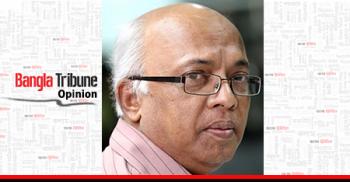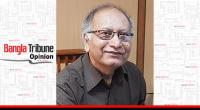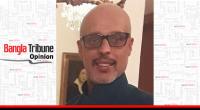 Decades ago, Bangabandhu Sheikh Mujibur Rahman came back home to us. It was a return from the depths of deathly darkness for him. It was, for his nation, a rejuvenation and a re-energising of liberty. It is for us today to recall the tall man that Bangabandhu was in our history.
Decades ago, Bangabandhu Sheikh Mujibur Rahman came back home to us. It was a return from the depths of deathly darkness for him. It was, for his nation, a rejuvenation and a re-energising of liberty. It is for us today to recall the tall man that Bangabandhu was in our history.
You remember the larger than life man he was. And you would do that because of the fundamental human qualities that defined his being. He inhabits our consciousness in all his larger-than-life presence. Tall for a Bengali, he gave us all to understand that in him shone bright all those traits which underpin the making of a political giant. His height, literally as well as figuratively, mattered. So did his convictions. He was our face to the world, in every sense of the meaning. Think about it, think about all the other significant political figures who in the course of our modern history influenced our evolution into where we happen to be today. Bangabandhu falls within that category. And yet he breaks free of all those earlier stars and forms, within and by himself, a world apart. Of all the historical icons we have had cause to observe in our political ambience, only Bangabandhu stayed steadfast in purpose. That element you call compromise, or a shifting of the ground, was not part of his nature. And fence-sitting was out of the question.
And that made all the difference. It became clear to Bangabandhu towards the end of the 1950s that Bengalis needed to make their way out of Pakistan. And remember that he came of a generation which in the 1940s went all the way into making sure that the Lahore Resolution of 1940 was implemented in the interest of the Muslims of India. That Sheikh Mujibur Rahman could break free of the communal mould when most of his contemporaries could not or would not, that he was beginning to question the very basis of the country in whose creation he, like millions of other young men, had once taken immense interest was an early hint of the greatness he was destined for. The path to that greatness was clearly laid out in 1966 when he overrode every other concern to inform the ruling classes of Pakistan as well as his people that it was time to reinvent the state through his Six Point programme for regional autonomy.
Bangabandhu was a man of huge self-esteem and an abundance of confidence.
Bangabandhu was our own. The mores and social norms we have grown up with were all exemplified in him. His smile radiated confidence and instilled courage in us. His sense of humour remains unmatched. He never forgot a face and always remembered names. His laughter reverberated across the room and beyond. He was always filling the room with his presence. When he met complete strangers, he made them feel they had known him all their life. When he found himself in the company of academics, he did not forget that these were men who deserved his unqualified respect. Alone among the great men we have known, he drew respect from the intellectual classes and the more humble of citizens alike. Across this land men of letters speak of Bangabandhu with reverence. And it is just as well. A copy of G.B. Shaw’s Man and Superman lay open on his bed on the terrible dawn he was done to death with his family, testimony to his love of reading. He kept diaries in his times in prison. He gave away a copy of Dostoyevsky’s Crime and Punishment to his jailor in Pakistan in early January as a parting gift. His library was a mark of intellectual affluence. He loved Tagore’s mysticism and Nazrul’s rebellious streak.
And all of Bangladesh --- its people, its villages and rivers and trees and plants and its baul traditions --- were his study of history, his gifts to the world beyond our frontiers. He was devoted to his faith and communed with God five times a day.
We mourn the passing of this great man today and every day of our collective life.
Here was a Caesar. When comes such another?
Syed Badrul Ahsan is the Editor-in-Chagre at the Asian Age


